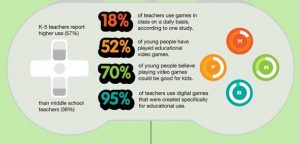

Welcome back to Press Play, your weekly column discussing gaming culture and anything else that is relative to gaming. Last week I looked at the ‘Ban Hammer’ in which I was discussing whether banning regulations should be more aggressive in online games to protect younger gamers. This week I decided to delve a lot further into the overall effects of games on children and teens to see which myths are true and which ones aren’t. I will source all the information below with links in case you want to read more on the topic yourself. There is a lot more information in these links than I offer and also please note that both the pictures below are also linked to their sources.
When I look back on my childhood and my gaming experience I can safely say I enjoyed every minute. However, gaming has come a long way since circa 1996 (when I started gaming) and many developments have happened such as social media games and MMORPGs. With this has come a massive wave of horror stories and a lot of blame on the video game industry. These stories and accusations usually revolve around children and teenage children. As well as this, games have now become more realistic and overall more violent and yet at the same time they are more artistic, interactive and educational. So I want to take a look at whether video games and the developments in the industry have affected children and the social behaviour online with children in a negative or positive way.
Before I jump into statistics, it is important for us to understand the views from both sides of this dilemma. There are many factors to take into account that are not explained, such as mental illnesses or emotional detachment. Playing games which have a lot of violence in it can trigger these children to act; it is not simply the video game’s fault for that action but rather the mental illness. Most of the statistics below are from studies and tests on normal, everyday children. However, the views that people take on this matter are complete polar opposites.
The first view is that if children are playing violent video games such as Grand Theft Auto then they are being desensitised to real-life actions such as drug dealing, murder and prostitution. The idea behind this is that some children who are playing these games will get so used to these actions being second nature in a virtual world that it will seep into their reality. So instead of being able to resolve an issue by talking it through with a bully or antagonist and resolving the matter, they could instead start an argument and end up having a physical conflict or, on the extreme end of that scale, shooting up a high school. The other view is that if children are playing violent video games then they are releasing frustration, anger and stress. By releasing these emotions they no longer build them up and in turn tend to enjoy healthily playing these games. Many researchers are said to believe that these games are just a virtual substitute for the usual actions in children, especially males.
The other view is that if children are playing violent video games then they are releasing frustration, anger and stress. By releasing these emotions they no longer build them up and in turn tend to enjoy healthily playing these games. Many researchers are said to believe that these games are just a virtual substitute for the usual actions in children, especially males.
This graph shows an example of how the video game industry is massively increasing, yet violence among children has fallen between 1996-2007. I took a look at these few years, as this was the biggest growth in the video game industry to date. The video game industry in this graph shows that its sales went from $2.3 billion to $9.1 billion in a decade. In that same period, violence amongst children went from 1.9 million reports to 1.7 million reports.
The above statistics seem to suggest that video games are not having an effect on children psychologically and that it is not the main reason for children who tend to pick physical arguments over verbal. According to NPD, 91% of U.S. children aged 2-17 play video games (64 million). So we have pretty much ruled out the argument that video-games are harmful. But what about education?
When it comes to education, most people automatically think that playing games is just killing brain cells and that it is a waste of time. However, there is a massive trend in teaching children skills and making boring subjects more fun through games, especially in schools. Playing video games helps train the brain and has the same effect as reading a book or riding a bike because, as the brain is learning, thousands of new connections are being formed. The addition of a rewards system like Sony’s PS3 trophy system motivates children to improve their skills. If you are playing a fast paced game such as shooter games like Call of Duty or Borderlands, it teaches your brain to make decisions 25% faster. There are many other advantages such as field deprivation. As you play more games you become more aware of your surroundings and what’s happening in the background. For example, if you shoot an enemy in front of you while noticing two or three other enemies to the side and behind your current target.
Gaming can also increase children’s ability to multitask. A good and simple showcase of this would be Tetris; while you are matching up the colours and shapes you are also deciding where to place the current row while looking at the next row to place. All the above skills make new connections in children’s brains to help in everyday life situations. Upon researching this area for this column I came across an interesting site named Playforce. This site hosts an array of games that can teach and improve on children’s skills in the classroom. This site was set up because there was such a high demand for educational games, especially for classrooms; now there are several new and fun ways for kids to learn subjects such as maths and other languages. These ideas also stimulate the brain with colours and speech as opposed to reading out of a book, which most children cannot stand to do.

The above picture shows that teachers in particular are starting to realise kids are more interactive in class through video games, with 20% saying they use video games daily to help entertain and teach children in the classroom. So now the only place left to look at is online gaming and its huge stigma. Now I looked at this previously last week so I will not dwell on it too much.
When it comes to online gaming in my opinion, you cannot go online without abuse being hurled down the other end of the microphone at you and it seems everybody has come across this problem. The usual sayings would be “You are a noob” or “Man you are so stupid”. This, in my opinion, is where the worst downsides of video games are. Nobody wants to log into a game to have abused hurled at them. Online revenue will account for 47% of console game revenue by 2018. It’s hard to tell if online games will just replace the current offline video game trend and, if it does, will it mean a bleaker future for children? From my experiences, there is a lot more bullying online. This will in turn affect children psychologically and could potentially help with an increase among violence in children.
Finally, from all my research above, I have come to the conclusion that everyday video gaming has not and will not harm children psychologically. As well as that, it seems you can use video games to educate children. I also think in the future there will be many more inventions for using video games in schools around the world as it is more stimulating and interesting for kids compared to sitting in class reading or writing. However, when it comes to online gaming I believe there is a very big risk of bullying as you cannot censor what people are saying verbally.
What do you guys think about all this? Do you think gaming affects children? Let me know in the comments below. As always, if there is a certain section you would like me to look into do suggest below too.










